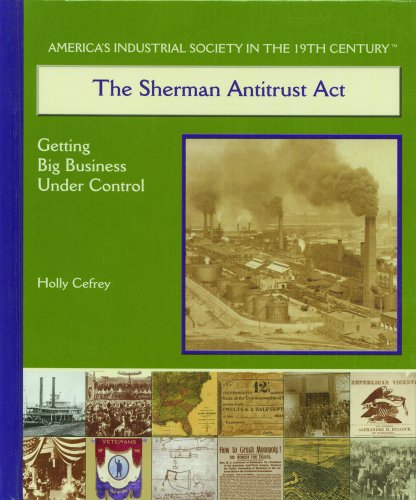-
America's Political Scandals in the Late 1800's: Boss Tweed and Tammany Hall
Corona Brezina
Paperback (Rosen Publishing Group, Jan. 1, 2004)William Boss Tweed was a powerful, corrupt Democrat during the second half of the 19th century. Through bribes and payoffs, he controlled the government and stole millions of dollars from New York City. Though there is little question that he and his Tammany Hall cohorts were far from honest, Tammany Hall controlled the city's government for years. But Boss Tweed also helped millions of immigrants as they worked to adjust to their new home and become American citizens. He gave them city jobs and provided food and fuel to help them survive. S
S
-
Oil, Steel, and Railroads: America's Big Business in the Late 1800s
Jesse Jarnow
Paperback (Rosen Publishing Group, Jan. 1, 2004)Examines the history of business in the United States during the 1800s, discussing the growth of railroads, and the innovations in the oil and steel industries. R
R
-
The Populist Party: A Voice for the Farmers in an Industrial Society
Bernadette Brexel
Paperback (Rosen Publishing Group, Jan. 1, 2004)Examines the history of the Populist Party in the United States, which was formed in 1892 to represent the needs of working-class citizens and bring about reform in government, big business, and labor laws. S
S
-
The Knights of Labor and the Haymarket Riot: The Fight for an Eight-Hour Workday
Bernadette Brexel
Paperback (Rosen Publishing Group, Jan. 1, 2004)Examines the early history of America's labor movement in the nineteenth century, particularly the fight for an eight-hour work day, and its effects on American business and workers. O
O
-
America's Political Scandals in the Late 1800s: Boss Tweed and Tammany Hall
Corona Brezina, Mark Beyer
Library Binding (Rosen Pub Group, Aug. 1, 2003)Examines the actions of Boss Tweed, the powerful, influential, and corrupt public works commissioner for New York City from 1863-1871, and of the political organization that he and his associates controlled. X
X
-
The Rise of American Capitalism: The Growth of American Banks
J T Moriarty
Paperback (Rosen Publishing Group, Jan. 1, 2004)Examines the economic history of the United States, from the paper money issued during the American Revolution through the rise of big business after the Civil War, and the effort to create a stable monetary system. S
S
-
Railroads and Steamships: Important Developments in American Transportation
Suzanne J Murdico
Paperback (Rosen Publishing Group, Jan. 1, 2004)Looks at the history of transportation in the United States, discussing the need for railroads and steamships and how they impacted the nation. S
S
-
Telegraph and Telephone Networks: Groundbreaking Developments in American Communications
Jesse Jarnow
Paperback (Rosen Publishing Group, Jan. 1, 2004)Examines the history of communication in the United States, particularly the technological advances of the late nineteenth century that improved transmission speed from weeks or months to hours or minutes. S
S
-
The Sherman Antitrust Act: Getting Big Business Under Control
Holly Cefrey
Library Binding (Rosen Pub Group, Aug. 1, 2003)Discusses the first act put in place to control big business and stop big businesses from controling an industry. M
M
-
Possibilities and Problems in America's New Urban Centers: The Rise of Cities
Suzanne J Murdico
Paperback (Rosen Publishing Group, Jan. 1, 2004)Discusses the problems faced in the cities during the Industrial Revoultion, including over-crowding, poor working conditions, and low wages. S
S
-
America's Industrial Society in the 19th Century Set 1
J. T. Moriarty, Jason Porterfield, Jesse Jarnow, Bernadette Brexel, Holly Cefrey, Corona Brezina
Library Binding (Rosen Publishing Group, Dec. 1, 2004)William Boss Tweed was a powerful, corrupt Democrat during the second half of the 19th century. Through bribes and payoffs, he controlled the government and stole millions of dollars from New York City. Though there is little question that he and his Tammany Hall cohorts were far from honest, Tammany Hall controlled the city's government for years. But Boss Tweed also helped millions of immigrants as they worked to adjust to their new home and become American citizens. He gave them city jobs and provided food and fuel to help them survive. R
R
-
The Interstate Commerce ACT: The Government Takes Control of Trade Between States
Holly Cefrey
Paperback (Rosen Publishing Group, Jan. 1, 2004)Discusses the growth of commerce in the United States during the eighteenth and nineteenth centuries, the need for some kind of regulation of interstate commerce, and the development of laws toward this end. S
S